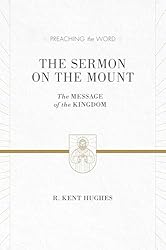EP 92: Blessed are the Merciful (Matthew 5:7 – Sermon on the Mount Series)
Showing mercy to others is a sign we have been redeemed.
And as the verse, Matthew 5:7 states: Blessed are the merciful, for they shall receive mercy.
If we are truly in Christ, we are then objects of His mercy, and we will then be merciful to others, and we will, in the end, receive mercy. Being merciful to others is evidence we have received mercy.
Showing mercy to others is a sign we have been redeemed.The word merciful here is eleemones, and it’s used here and in Hebrews 2:17 in this form. It comes from ele’eo and it means to have mercy on. It refers to one who is actively compassionate or one who is benevolently merciful involving thought and action.
It reflects being concerned about people in their need. One might say they are “mercy full”! or full of mercy.
The idea is that they possess a compassionate heart leading to acts of mercy, the purpose of which is to relieve the suffering and misery of the object of that compassion.
“Those who know they have received mercy, show mercy. And the merciful are greatly blessed, because they will receive mercy from God himself.”
~ Sinclair Ferguson
Listen in to the Podcast Below or Subscribe on Your Favorite App:
Related Quick Links:
Studies in the Sermon on the Mount by Martyn Lloyd Jones
The Sermon on the Mount: The Message of the Kingdom by R. Kent Hughes
AGTV – Use the code – BAR1 – for 10% off your monthly subscription
Read the Sermon on the Mount – Matthew 5-7
Blessed are the Merciful @Thankful Homemaker YouTube Channel
Sermon on the Mount YouTube Video Playlist
Open Hearts in a Closed World Podcast
Show Notes:
“We’re talking about something that’s not human at all, it’s divine. We’re moving out of the kingdom of darkness, out of the kingdom of men, out of the kingdom of this world, into the kingdom of God. We’re talking about a kind of mercy that’s operative in God’s kingdom, not in man’s kingdom.”
~John MacArthur, The MacArthur New Testament Commentary, Matthew 1-7
“The Hebrew word for “mercy” is a beautiful word used very often in the Old Testament, and sometimes the Hebrew word is translated in the Septuagint by the Greek word, ele’eō. It’s the word chesed. It really is untranslatable. You can hardly reduce it to one word but most often the Old Testament writers in most translations intend it to say what I think the English word ‘lovingkindness’ expresses. Lovingkindness embraces a motive and an action, and it is often translated loving-kindness. It does not mean simply to feel sympathetic. It does not mean simply to feel compassionate. It refers to the ability to literally get inside someone else’s skin until you think their thoughts, feel their emotions, understand their pain. It is more than a passing wave of pity. It is an empathizing, it is a deliberate act of feeling their suffering and seeking to relieve it.”
~ John MacArthur, The MacArthur New Testament Commentary, Matthew 1-7
Ray Pritchard explained that mercy includes three elements…
1. ”I see the need”—that’s recognition.
2. “I am moved by the need”—that’s motivation.
3. “I move to meet the need”—that’s action.
When we understand the forgiving grace of Christ we will be forgiving towards others.“Our Lord is really saying that I am only truly forgiven when I am truly repentant. To be truly repentant means that I realize I deserve nothing but punishment and that if I am forgiven it is to be attributed entirely to the love of God and to His mercy and grace, and to nothing else at all. But I go further; it means this. If I am truly repentant and realize my position before God and realize that I am only forgiven in that way, then of necessity I shall forgive those who trespass against me. Let me put it like this. I have taken the trouble to point out in each case how every one of these Beatitudes follows the previous one. This principle was never more important than it is here. This Beatitude follows all the others; therefore I put it in this form. I am poor in spirit; I realize that I have no righteousness; I realize that face to face with God and His righteousness I am utterly helpless; I can do nothing. Not only that. I mourn because of the sin that is within me; I have come to see, as the result of the operation of the Holy Spirit, the blackness of my own heart. I know what it is to cry out, ‘O wretched man that I am! who shall deliver me?’ and desire to be rid of this vileness that is within me. Not only that I am meek, which means that now I have experienced this true view of myself, nobody else can hurt me, nobody else can insult me, nobody can ever say anything too bad about me. I have seen myself, and my greatest enemy does not know the worst about me. I have seen myself as something truly hateful and it is because of this that I have hungered and thirsted after righteousness. I have longed for it. I have seen that I cannot create or produce it and that nobody else can. I have seen my desperate position in the sight of God. I have hungered and thirsted for that righteousness which will put me right with God, that will reconcile me to God, and give me a new nature and life. And I have seen it in Christ. I have been filled; I have received it all as a free gift.”
~ Martyn Lloyd Jones, Studies in the Sermon on the Mount
We are to feel a sense of sorrow for all who are helpless slaves of sin. That is to be our attitude towards people. -Martyn Lloyd Jones“It was at a church service in Munich that I saw him, the former S.S. man who had stood guard at the shower room door in the processing center at Ravensbruck. He was the first of our actual jailers that I had seen since that time. And suddenly it was all there—the roomful of mocking men, the heaps of clothing, Betsie’s pain-blanched face. He came up to me as the church was emptying, beaming, and bowing. ‘How grateful I am for your message, Fraulein,’ he said. ‘To think that, as you say, He has washed my sins away!’ His hand was thrust out to shake mine. And I, who had spoken so often to the people in Bloemendaal the need to forgive, kept my hand at my side. Even as the angry, vengeful thoughts boiled through me, I saw the sin of them. Jesus Christ had died for this man; was I going to ask for more? Lord Jesus, I prayed, forgive me and help me to forgive him. I tried to smile, I struggled to raise my hand. I could not. I felt nothing not the slightest spark of warmth or charity. And so again I breathed a silent prayer. Jesus, I cannot forgive him. Give me Your forgiveness. As I took his hand the most incredible thing happened. From my shoulder along my arm and through my hand a current seemed to pass from me to him, while into my heart sprang a love for this stranger that almost overwhelmed me.”
~ Corrie Ten Boom, The Hiding Place
“How is it that we claim to be Christians, yet show so little mercy? Why are we so self-seeking, choosing a lifestyle of convenience rather than a self-sacrificing lifestyle of showing mercy? Is it because we have only a superficial understanding of the riches of God’s kindness to us? There can be no other explanations. Those who have been forgiven much, love much. Those who know they have received mercy, show mercy. And the merciful are greatly blessed because they will receive mercy from God himself.”
~ Sinclair Ferguson, Sermon on the Mount
Scripture References:
Matthew 5:7
Matthew 5:1-12
Galatians 2:20
Hebrews 2:17
Lamentations 3
Matthew 18
Matthew 6:9-13
Ephesians 2:8-9
Luke 10:25-37
Luke 10:25-28
Hosea 6:6
Micah 6:8
Psalm 103:14
Resources:
Studies in the Sermon on the Mount by Martyn Lloyd Jones
Sermon on the Mount The: Matthew 5-7 Expositional Commentary by James Montgomery Boice
Matthew 1-7 MacArthur New Testament Commentary by John MacArthur
Expository Thoughts on the Gospel of Matthew by J.C. Ryle
The Sermon on the Mount: The Message of the Kingdom (ESV Edition) by R. Kent Hughes
Sermon on the Mount by Sinclair Ferguson
The Beatitudes: An Exposition of Matthew 5:1-12 by Thomas Watson
The Message of the Sermon on the Mount by John Stott
Sermon on the Mount Teaching Series by Sinclair Ferguson at Ligonier Connect
The Beatitudes by R.C. Sproul at Ligonier Connect
The Beatitudes from 50,000 Feet Sermon by Alistair Begg
The Beatitudes, Part 3 (Matthew 5:7-9) – Sermon by R.C. Sproul
The Only Way to Happiness: Be Merciful – Sermon by John MacArthur
Study Guide for Sermon on the Mount at Blue Letter Bible







